This article was co-authored by Anthony Stark, EMR and by wikiHow staff writer, Jessica Gibson. Anthony Stark is a certified EMR (Emergency Medical Responder) in British Columbia, Canada. With over 11 years of experience, he has worked as an industrial medic and provided urban and rural paramedic services. He currently works for Mountain View Safety Services and previously worked for the British Columbia Ambulance Service. Anthony has a Bachelor of Engineering in Electrical, Electronics, and Communications Engineering from the Georgia Institute of Technology. He has completed the EMP Canada EMT Course and Swiftwater Awareness Training associated with the British Columbia Ambulance Service.
There are 19 references cited in this article, which can be found at the bottom of the page.
wikiHow marks an article as reader-approved once it receives enough positive feedback. This article has 11 testimonials from our readers, earning it our reader-approved status.
This article has been viewed 398,499 times.
Hernias can occur in a number of different parts of the body. They can also cause pain and discomfort. This is because during a hernia, the contents of one part of your body push through into surrounding tissue or muscle. Hernias can happen in the abdomen, around the belly button (umbilicus), in the groin area (femoral or inguinal) or at the stomach. If you have a stomach hernia (hiatal), you'll probably experience hyperacidity or acid reflux. Fortunately, you can manage the pain at home and make lifestyle changes to relieve some hernia discomfort.
Things You Should Know
- Apply an ice pack to the area for 10-15 minutes to relieve pain and swelling. You can do this 1-2 times per day.
- Take OTC pain relievers like ibuprofen and acetaminophen to soothe mild to moderate pain. If you're in severe pain, see a doctor for something stronger.
- Try OTC antacids for reflux caused by a hiatal (stomach) hernia. If you have an inguinal (groin) hernia, talk to your doctor about wearing a truss.
Steps
Treating Hernia Pain at Home
-
1Use ice packs. If you're feeling relatively mild discomfort, apply an ice pack to the site of your hernia for 10 to 15 minutes. You can do this once or twice a day after approval from your doctor. Cold packs may reduce swelling and inflammation.[1]
- Never apply ice or an ice pack directly to your skin. Make sure to wrap the ice pack in a thin cloth or towel before placing it on your skin. This will prevent damage to your skin tissue.
-
2Take medication to manage pain. If you're experiencing moderate hernia pain, you may get some relief from over-the-counter (OTC) pain relievers like ibuprofen and acetaminophen. Always follow the manufacturer's dosing instructions.[2]
- If you find yourself relying on OTC pain medications for more than a week, talk with your doctor. Your doctor might be able to prescribe a stronger pain medication.
Advertisement -
3Take medication to treat reflux. If you have a hiatal hernia (of the stomach), you probably have hyperacidity known as reflux. You can take over-the-counter (OTC) antacids and medications to reduce acid production, as well as prescription medications like proton pump inhibitors (PPI) that reduce acid production.[3]
- If your reflux symptoms don't improve after several days, you should see your doctor. If left untreated, reflux can severely damage your esophagus. Instead, your doctor can prescribe medications that treat the reflux and heal your digestive organs.
-
4Wear a support or truss. If you have an inguinal hernia (of the groin), you may want to wear a special support which can also reduce your pain. Talk with your doctor about wearing a truss which is like supportive underwear. Or, you might wear a support belt or harness that helps keep the hernia in place. To wear a support, lay down and wrap the belt or harness around the hernia to keep it snug.
- Supports or trusses should only be worn for a short period of time. You should realize that they won't heal your hernia.[4]
-
5Try acupuncture. Acupuncture is a traditional medicine that adjusts the body's energies by inserting slender needles into specific energy points. You may be able to manage your hernia pain by stimulating pressure points that are known to reduce pain. Find a certified acupuncturist who has experience relieving hernia pain.[5]
- Acupuncture may relieve your hernia pain, but you should still seek medical treatment to treat the actual hernia.
-
6See a doctor immediately if you are experiencing severe pain. If you suspect you have a hernia, you feel any unusual mass in your abdomen or groin, or you have hyperacidity or heartburn, make an appointment to see your doctor. Most hernias can be diagnosed by a physical exam and review of symptoms. If you've already seen your doctor, but your symptoms haven't improved after a few weeks, contact your doctor for another appointment.
- If you are experiencing unusual pain with your hernia and you have been diagnosed with an abdominal, inguinal or femoral hernia, call your physician or the ER right away-- the pain could indicate a medical emergency.
-
7Get surgery. Although you can manage your hernia pain at home, you won't be able to treat the hernia. Talk with your doctor about surgery options. Your doctor may recommend a surgical procedure where a surgeon operates to push the protruding muscle back into place. Or, a surgeon may do a less invasive procedure where small incisions are made in order to repair the hernia with a synthetic mesh.[6]
- If your hernia doesn't bother you often and your doctor believes it to be small, the doctor may not recommend surgery.
Making Lifestyle Changes
-
1Eat smaller meals. If you're experiencing heartburn from a hiatal hernia, put less pressure on your stomach. To do this, eat smaller portions of food in each sitting. You should also eat slowly so that your stomach digests food easier and faster. This can also reduce pressure on the stomach sphincter (LES), a muscle that is already weakened.[7]
- Try to avoid eating 2 to 3 hours before going to bed. This will prevent food from putting pressure on your stomach muscles as you try to fall asleep.
- You may also want to change your diet to reduce excess stomach acid. Avoid high fat foods, chocolate, peppermint, alcohol, onions, tomatoes, and citrus.[8]
-
2Reduce pressure on your abdomen. Wear clothing that doesn’t constrict your stomach or abdomen. Avoid wearing tight clothing or belts. Instead, choose tops that are loose around your waist. If you do wear a belt, adjust it so that it doesn't tightly hug your waist.[9]
- When you constrict your stomach or abdomen, you can cause recurrent hernias and make hyperacidity worse. The acid in your stomach can be forced back into your esophagus.
-
3Lose weight. If you're overweight, you're putting extra pressure on your stomach and abdominal muscles. This extra pressure can increase your risk for developing another hernia. It can also make acid in your stomach back up into your esophagus. This can cause reflux and hyperacidity.[10] [11]
- Try to lose weight slowly. Aim to lose no more than a pound or two a week. Talk to your doctor about adjusting your diet and exercise plan.
-
4Exercise key muscles. Since you shouldn't lift heavy things or strain, try to do exercises that strengthen and support your muscles. Lay flat on your back and try one of the following stretches:
- Bring your knees up so that your legs are slightly bent. Place a pillow in between your legs and use your thigh muscles to squeeze the pillow. Relax your muscles and repeat this stretch ten times.
- Keep your hands at your sides and lift your knees off the ground and into the air. Using both legs, do a pedaling motion in the air. Keep doing this until you feel muscle strain in your abdomen.
- Bring your knees up so that your legs are slightly bent. Place your hands on the back of your head and bend your torso up by about 30 degrees. Your torso should be closer to your knees. Hold this position and carefully recline. You can repeat this 15 times.
-
5Stop smoking. If you're experiencing reflux, try to stop smoking. Smoking can increase your stomach acid, making the reflux worse. And, if you're planning on getting surgery to treat your hernia, your doctor will most likely advise you to quit smoking in the months leading up to the surgery.[12]
- Smoking will make it harder for your body to heal after the surgery and it can raise your blood pressure during the surgery. Smoking also increases your risk for developing recurrent hernias and infection from surgery.
Using Herbal Remedies
-
1Use shepherd's purse. This plant (considered to be a weed) has traditionally been used to relieve swelling and pain. Apply shepherd's purse essential oil to the area where you're feeling hernia pain. You could also purchase shepherd's purse supplements to take it orally. Always follow the manufacturer's dosing instructions.[13]
- Studies have shown that shepherd's purse is an anti-inflammatory.[14] It can also prevent infection.
-
2Drink an herbal tea. If you're experiencing nausea, vomiting, and reflux caused by your hernia, drink a ginger tea. Ginger is anti-inflammatory and soothes the stomach. Steep ginger tea bags or cut up 1 teaspoon of fresh ginger. Steep the fresh ginger in boiling water for 5 minutes. It's especially helpful to drink ginger tea about half an hour before eating. It's also safe for pregnant and nursing women.[15]
- Consider drinking fennel tea to settle your stomach and reduce the acid in your stomach. Crush up a teaspoon of fennel seeds and steep them in a cup of boiling water for 5 minutes. Drink 2 to 3 cups a day.
- You can also drink powdered or prepared mustard dissolved in water or drink chamomile tea. All of these are anti-inflammatory and can calm your stomach by reducing acid.[16]
-
3Take licorice root. Look for licorice root (deglycyrrhizinated licorice root) in chewable tablet form. Licorice root has been shown to heal the stomach while controlling hyperacidity. Be sure to follow the manufacturer's instructions. This usually means taking 2 or 3 tablets every 4 to 6 hours.[17]
- Be aware that licorice root can cause a lack of potassium in your body, which can lead to heart arrhythmias. Talk to your doctor if you take large quantities of licorice or use it for more than two weeks.
- Slippery elm is another herbal supplement to try as a drink or tablet. It coats and soothes irritated tissues and is safe to use during pregnancy.[18]
-
4Drink apple cider vinegar. If you have severe reflux, you might try drinking apple cider vinegar. Some believe that the extra acid will tell your body to reduce its own acid production in a process called feedback inhibition although more research is needed. Mix 1 tablespoon of organic apple cider vinegar to 6 ounces of water and drink it.[19] If you like, you can also add a bit of honey to improve the flavor.
- A variation of this approach is to make you own lemonade or limeade. Just mix a few teaspoons of pure lemon or lime juice and add water to taste. If you want, add a bit of honey to the drink. Drink this before, during and after meals.
-
5Drink aloe vera juice. Choose organic aloe vera juice (not gel) and drink 1/2 cup. Although you can sip this throughout the day, you should limit your daily intake to 1 to 2 cups. This is because aloe vera can act as a laxative.[20]
- Studies have shown that aloe vera syrup can treat symptoms of acid reflux by reducing inflammation and neutralizing stomach acid.[21]
References
- ↑ https://emedicine.medscape.com/article/149608-technique
- ↑ http://www.drugs.com/cg/inguinal-hernia.html
- ↑ http://www.mayoclinic.org/diseases-conditions/hiatal-hernia/basics/treatment/con-20030640
- ↑ http://www.mayoclinic.org/diseases-conditions/inguinal-hernia/expert-answers/hernia-truss/faq-20058111
- ↑ http://www.home-remedies-for-you.com/remedy/Hernia.html
- ↑ http://www.mayoclinic.org/diseases-conditions/inguinal-hernia/basics/treatment/con-20021456
- ↑ https://www.mayoclinic.org/diseases-conditions/hiatal-hernia/diagnosis-treatment/drc-20373385
- ↑ http://www.aboutgerd.org/diet-lifestyle-changes/diet-changes-for-gerd.html
- ↑ https://my.clevelandclinic.org/health/diseases/8098-hiatal-hernia/management-and-treatment
- ↑ http://www.med.umich.edu/1libr/Surgery/GenSurgery/HerniaObesity.pdf
- ↑ http://www.mayoclinic.org/diseases-conditions/gerd/basics/lifestyle-home-remedies/con-20025201
- ↑ https://www.nhs.uk/conditions/hiatus-hernia/
- ↑ http://www.home-remedies-for-you.com/remedy/Hernia.html
- ↑ http://www.ncbi.nlm.nih.gov/pmc/articles/PMC3951821/
- ↑ Willetts, K. E., Ekangaki, A. and Eden, J. A. (2003), Effect of a ginger extract on pregnancy-induced nausea: A randomised controlled trial. Australian and New Zealand Journal of Obstetrics and Gynaecology, 43: 139–144.
- ↑ Vemulapall, R. Diet and Lifestyle Modifications in the Management of Gastroesophageal Reflux Disease. Nutr Clin Pract June 2008 vol. 23 no. 3 293-298.
- ↑ Glick, L., Deglycyrrhizinated liquorice for peptic ulcer. Lancet. 1982 Oct 9;2(8302):817.
- ↑ Petry JJ, Hadley SK. Medicinal herbs: answers and advice, Part 2.Hosp Pract (1995). 2001 Aug 15;36(8):55-9.
- ↑ Petry JJ, Hadley SK. Medicinal herbs: answers and advice, Part 2.Hosp Pract (1995). 2001 Aug 15;36(8):55-9.
- ↑ http://www.mayoclinic.org/drugs-supplements/aloe/evidence/hrb-20058665
- ↑ http://www.ncbi.nlm.nih.gov/pubmed/26742306
About This Article
To relieve hernia pain, apply ice to the area twice a day to reduce swelling and inflamation. You can use an ice pack or frozen vegetables, just make sure you wrap it in a towel and don't apply it for longer than 15 minutes, which could damage your skin. If you have a groin hernia, ask your doctor about wearing a truss, which is a type of supportive underwear designed to take pressure off your hernia. To reduce reflux caused by a hiatal hernia, eat smaller meals, which will relieve pressure on your stomach. You can also drink herbal tea, like ginger or fennel to reduce nausea, vomiting, and acid reflux. If you’re still suffering from hernia pain, take over-the-counter pain relievers, like ibuprofen and acetaminophen. For more tips from our Medical co-author, including how to do light exercises to take pressure off your hernia, read on.
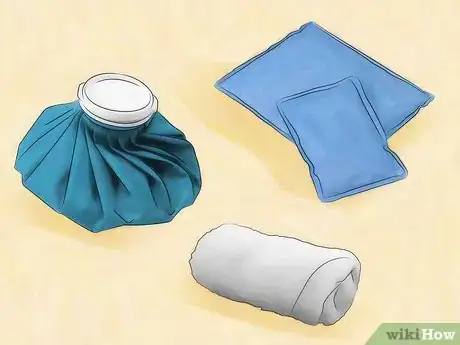
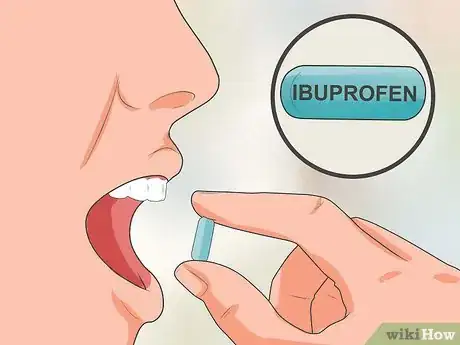

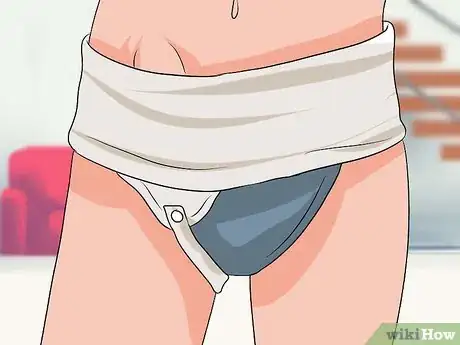


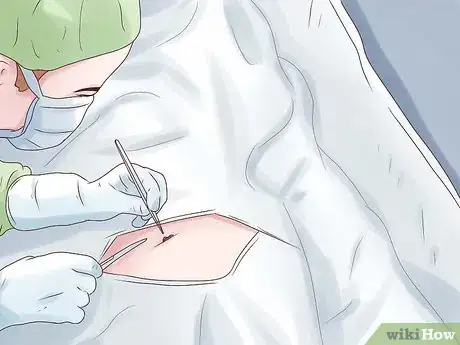

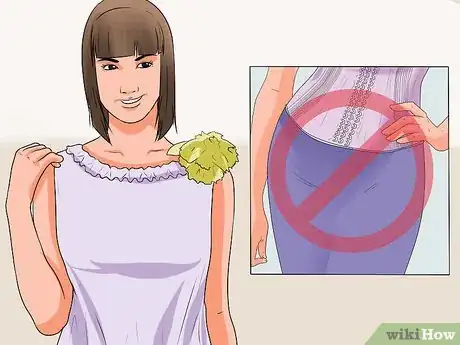
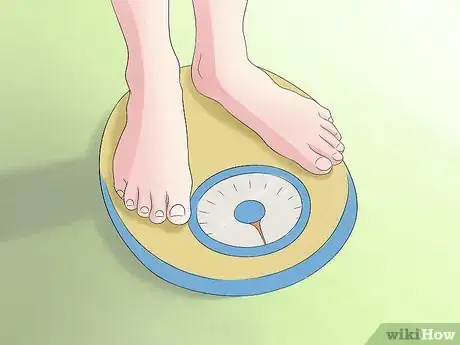


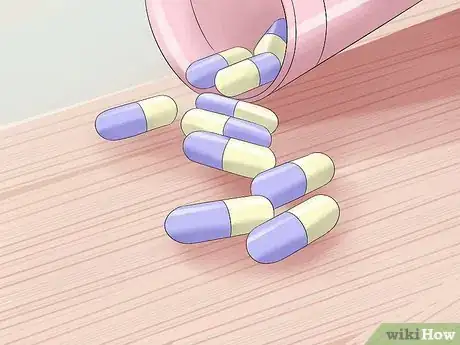






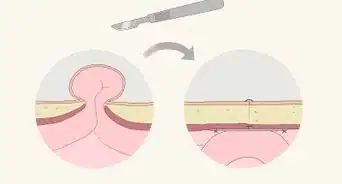



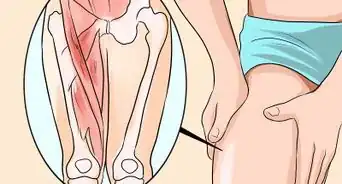

















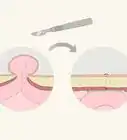




































Medical Disclaimer
The content of this article is not intended to be a substitute for professional medical advice, examination, diagnosis, or treatment. You should always contact your doctor or other qualified healthcare professional before starting, changing, or stopping any kind of health treatment.
Read More...